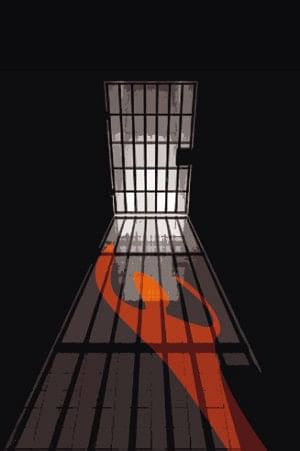 Cover Story Cover Story
THE TRADITION OF TORTURE
Ninety people in Bangladesh so far have lost their lives this year in reported crossfire, encounters, and gunfights with law enforcers and were allegedly tortured to death while in the custody of law enforcement agencies. Governments have tacitly given law enforcement officers the freedom to arrest anyone indiscriminately, sometimes a license to kill if necessary. Those who are dead cannot protest and those who survive the atrocity are too traumatised to demand justice for themselves.
Anika Hossain
"It happened almost six years ago, but I still have violent thoughts about killing the policemen who brutalised me." Faizul Munir Chowdhury, tries hard to keep his face expressionless as he recalls the single incident in his life, which torments him endlessly. On March 2004, Chowdhury, who is the General Secretary of the Ramna unit of Awami League, and his friend were returning home from a wedding when about 60 policemen stopped their rickshaw in the Mouchak area and arrested them without explanation.
They were then taken to the Ramna Police Station, where they were tied up, blindfolded and placed in a small cell. Chowdhury recalls waiting in the cell for about an hour until the policemen came for him and guided him to an adjoining room. He was still blindfolded but he could hear the sound of chains clanking as they prepared to bind him once again. He felt the chains cut through his wrists as he was hoisted into the air and hung by his hands, a few feet off the ground. And then the torture began.
They used what Chowdhury assumes were their batons to hit him from either side as he swung back and forth. "It was excruciatingly painful during first few blows, but my body became numb eventually. At one point, I could hear the loud sickening sounds made by the batons as they made contact with my body, but I felt no pain. Even my mind had gone numb."
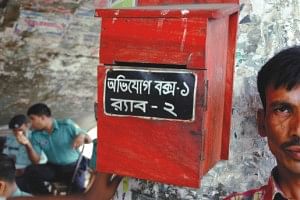 |
A complaint box placed by the Rab. Photo: Amirul Rajiv |
As they issued blow after blow, they kept asking him about hidden weapons and questions about political figures involved with Awami League, whom Chowdhury worked for and the more he denied knowing anything about illegal weapons, the harder they struck. After what seemed to be several hours in the cell, a man came by, whose voice Chowdhury did not recognise, and asked them to unbind him and give him some water.
"He was probably a policeman, because they followed his instructions, but to me he seemed like an angel sent to save me," says Chowdhury. He was kept in remand overnight, and the next day, he could barely walk. He remembers feeling shame and guilt about putting his family through so much worry and decided he would not tell them what happened. He was scheduled to be taken to court later that day along with the 18 young men who were arrested around the same time.
On the way there, Chowdhury and a few others shouted out their party's slogan "Joy Bangla, Joy Bangabandhu", which made the officers turn the car around and take them back to the Ramna station, where they were bound and blindfolded once again and beaten mercilessly.
"The OC (officer in charge) knew what was happening but he did not put a stop to it," recalls Chowdhury. They used obscene language and struck him as four officers stood on his arms and legs, pinning him to the floor.
Chowdhury has a haunted expression in his eyes as he narrates the incidents. When they were ready to drive him to court once again, Chowdhury was unable to stand straight. He begged his lawyer to ask for a day's reprieve before they continued their torment and was relieved when he was sent to jail instead of being taken back into remand.
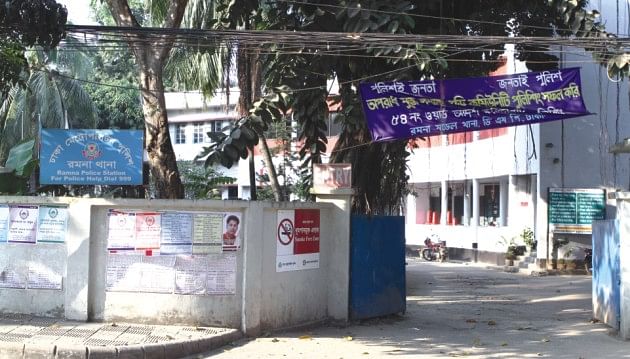
The Ramna Police Station. Photo: zahedul i khan
After his release, he had several medical problems, including kidney dysfunction. He lived in fear of the police for a while and had lost faith in the law altogether. He had problems sleeping and would often recall the incident and feel insecure and helpless. It has been six years but the memories plague him till today.
Former OC of Ramna Police Station could not be contacted as he is currently absconding after a warrant was issued for his arrest on September 22, 2010 for torturing Mohammad Abu Abbas Bhuiyan, a Chhatra League leader, in police custody.
For centuries, torture has been a perverted human interaction, characterised by extreme humiliation, degradation and dehumanisation, as the torturer inflicts severe physical and psychological suffering on the victim. The torturer/victim relationship is that of anonymity and of extreme dependency, which allows the victim to be easily manipulated psychologically. At an individual level, torture is used as a form of punishment and is a way to destroy a human being through systematic infliction of unbearable pain and psychological suffering. It is also used to destroy the victim's identity by forcing him/her to betray their comrades and become a traitor to his/her ideology.
At a social level, authoritarian governments use torture as an instrument to create fear and intimidate groups of people who express opposition towards government policies. In countries like Bangladesh, this practice of terror is widespread and entire communities are affected by violence. Torture in custody is quite customary in this country. It is used to extort information or confessions, force people to give false statements and often, to take revenge against opponents. Law enforcing officers use their power to arrest individuals, often without sufficient evidence of their alleged crimes and violate their basic human rights.
The scars inflicted physically may fade, but the long-term damage to the psyche is often neglected and continues to eat away at the victims throughout their lifetime.
The police are not by any means the only transgressors who practice torture. In another case, Mahir Hossain (not his real name) and his uncle (who wishes to remain anonymous) were arrested in front of his shop on December 2007, by Rab (Rapid Action Battallion) officers, when he requested them to move their car, which was blocking the store's entrance. The Rab officers, who were in plain clothes, refused to do so and a heated argument took place between Hossain and the officers, followed by a scuffle.
The officers identified themselves after this and arrested both Hossain and his uncle out of what Hossain describes as "pure spite." They were kept at the Rab camp in Tikatuli (Rab-3) for 24 hours. This place, which was previously a community centre, consisted of two cells, one considerably larger than the other. "My uncle was terrified and he kept asking me if they would beat us, and I said yes. I was not prepared for what happened after that," says Hossain. They were taken to the larger cell, which had a large electric chair in the centre and a toilet in a corner, he adds. "We were not allowed to use this toilet, and had to walk all the way across the floor to use their facilities. What chilled me to the bone about this cell were the ominous looking bloodstained walls. My uncle was made to sit on the electric chair and his neck, wrists and ankles were immediately immobilised with metal binders.”
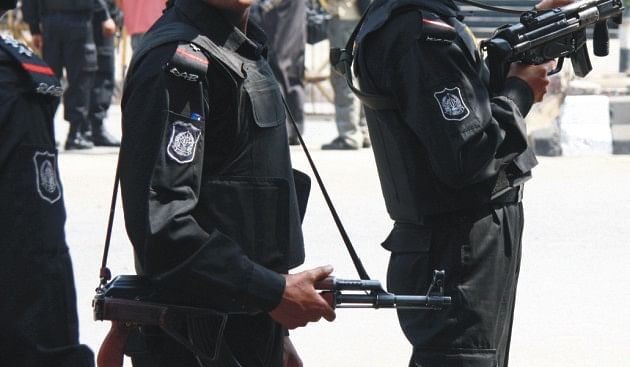
For any democratic society, it is important for citizens to trust law enforcement agencies.
“I was cuffed at the wrist and they used a machine, which lifted me off the floor and hung me by the wrists from the ceiling, and it slowly revolved as they prepared for their onslaught. They hung me for four hours while three officers beat me barbarically with their batons, cane sticks and wooden clubs till my body became numb. The first stick broke into three pieces as it made contact with my body. As they beat me they kept asking if I would ever raise a hand on a Rab officer again and used filthy language to abuse my family and myself. The torture on my uncle was less brutal. Luckily, they did not administer electric shocks."
At one point, they brought in dried chillies and threatened to rub them on their wounds, says Hossain, but that was just another scare tactic, to keep the victims nervous and guessing their next move.
After the four hours of torment were over, they were served food but were unable to eat. Hossain was dragged to the smaller cell, which was dirty and roach infested. The sheets on the narrow bed were bright red, and Hossain guesses that this was to camouflage the bloodstains on them. "As I collapsed on the bed, they handed me a large pill the size of a 5 Taka coin, and ordered me to take it for my pain. The medication made me drowsy and I slept all night." The next day, they were taken to a local police station, finger printed and photographed and released with the threat that they may be brought in again if they do not shape up.
Hossain remembers when he entered the cell in the police station that night, people were crying about the various injuries inflicted upon them by the police, but when he changed into the fresh clothes he was given in front of everyone in the cell, a hush fell over as the prisoners looked at his bruises and injuries in horror.
That silence still haunts him at times. "The incident left me with many physical scars, but I was not affected mentally. I was disturbed about it initially, but I spoke to my friends and family and that helped. My mama wasn't that lucky. He started having nightmares and was terrified of any uniformed officer. He started abusing drugs to forget what happened, but that only made things worse."
The Rapid Action Batillion, however, denies any wrongdoing. “We never use illegal measures against people we apprehend. We uphold human rights and have zero tolerance for physical torture. Besides, we only hold people in our custody for 24 hours if we need to question them and after that we hand them over to the authorities. We follow the legal procedure for questioning and do not use excessive force,” states Major Sakhawat, acting director of the Rab media wing, when asked if torturing people in the Rab custody is a common practice.
Hossain claims his mental state was not affected by this experience, but according to clinical psychologist Ishrat Shermin Rahman, this detachment from one's emotions is a symptom that a person has experienced psychological trauma. According to Rahman, "Many victims of torture may believe their physical injuries are all they sustained during their ordeal and mental injuries or scars are often left unattended. In such cases, the long term effects of this negligence can be devastating," as can be seen in Hossain's uncle.
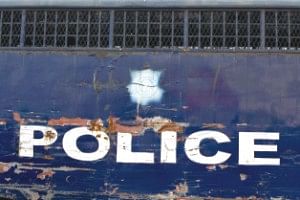 "Victims of trauma related to torture can display many symptoms which may not be noticeable because they are not obviously related to the trauma. Victims suffer from guilt and depression, they constantly find faults in themselves and others close to them. They develop relationship problems, and they withdraw emotionally from people they are close to, pick fights, argue and are generally unpleasant as a way of venting their confused and frustrated feelings,” relates Rahman. “The victims also withdraw from social activity, activities they enjoyed taking part in before and avoid social gatherings. If their physical injuries are long lasting or permanent, they believe they will never be normal again and develop a low self-esteem. Drug and alcohol abuse can also be seen in them," she says. "Victims of trauma related to torture can display many symptoms which may not be noticeable because they are not obviously related to the trauma. Victims suffer from guilt and depression, they constantly find faults in themselves and others close to them. They develop relationship problems, and they withdraw emotionally from people they are close to, pick fights, argue and are generally unpleasant as a way of venting their confused and frustrated feelings,” relates Rahman. “The victims also withdraw from social activity, activities they enjoyed taking part in before and avoid social gatherings. If their physical injuries are long lasting or permanent, they believe they will never be normal again and develop a low self-esteem. Drug and alcohol abuse can also be seen in them," she says.
According to Rahman, if these symptoms occur within 4 weeks of the traumatic event, victims can be diagnosed with Acute Stress Disorder (ASD). ASD is also characterised by intense fear, helplessness and horror. Either while experiencing, or after experiencing torture, the victims tend to display 'dissociative symptoms' such as a sense of detachment or absence of emotional awareness. There may be a sense of 'derealisation' (detachment from reality), depersonalisation (detachment from oneself) and dissociative amnesia which involves the inability to recall an important aspect of the trauma. The trauma is relived through recurrent thoughts, images, flashbacks, dreams and illusions and the victim displays significant anxiety/stress when exposed to memories of the incident, as can be seen in Faizul Munir Chowdhury's case. Chowdhury recalls vivid dreams about his torture and often has flashbacks when faced with anything that triggers memories of this incident.
"If the symptoms remain for 3 months or longer, the victim can then be diagnosed with Post Traumatic Stress Disorder (PTSD). A person suffering from PTSD will display all the symptoms seen in persons with ASD, as well as extreme rage, hyper vigilance, lack of concentration, lack of emotional control, sleep disorders, bouts of uncontrollable shivering, faster heartbeat and they may startle easily by the slightest touch or sound. The victim will also try his/her best to block out the memories of the trauma by avoiding places and people related to the incident,” says Rahman.
"I was always a sound sleeper, but ever since I was tortured, the smallest sounds will wake me up. I also have repeated nightmares about being blindfolded, tied up, and beaten and wake up feeling like the most helpless and terrified person in the world. It has been so long since this happened but I am still wary when I see a police officer on the street,” shares Chowdhury.
"The treatment for ASD and PTSD is a long and gradual process," says psychologist Rahman, " It involves behaviour and thought correction therapy to help reduce the pain of the experience and rehabilitate the victim into society. The first step would be to get to know the victim, who will be insecure and distrustful toward any caregiver. It is important to show empathy, listen carefully to everything he/she says, provide support and build a rapport to gain their confidence. The more the victim opens up and talks about what happened to them, the fewer symptoms they will display over time.”
It is also important to understand exactly what the problem is and try to give the victim insight into the situation. Helping them believe that they are not lonely or helpless and they do not need to feel insecure is very important. When the victims blame themselves for what happened and feel guilty and withdraw from people, it is important to reassure them and give them social skills training to regain confidence and interact normally with those around them.
Helping the victim understand and remind of their good qualities is also crucial in improving their self-esteem. Engaging them in creative activities can help get their minds off unpleasant thoughts and feelings. They can also be taught techniques to deal with their fear around trauma related places and people (Rab and police officers for example). Helping them with decision-making, sleep disorders and mood swings are all a part of the therapeutic process.
Relaxation therapy and distraction techniques are also extremely helpful when dealing with anxiety and sleep disorders. Bedtime rituals such as backward counting, breathing and imagination exercises can also be helpful. People suffering from PTSD can develop sexual problems and there is therapy designed to help with this as well. Everyone reacts differently to trauma so it is important to understand each victim and cater to their needs accordingly.
The practice of physical torture during imprisonment has become a norm in this country.
According to a research conducted by human rights organisation Odhikar, 35 persons reported that they were tortured by law enforcement officers, between January and September 2010. Of these, four were allegedly tortured by the Rab and 31 by the police.
During the same time period, 87 persons died either while they were in law enforcement custody or in crossfire. Of these, 16 were allegedly tortured to death, 3 by Rab and 13 by the police, 47 persons died while in jail custody due to alleged illness and 2 persons passed away while in court custody.
In Bangladesh, there is no legal definition for the term torture. The laws pertaining to physical and psychological abuse in the Constitution of Bangladesh contradict each other. Aricle 35(5) of the Constitution states, “No person shall be subjected to torture or cruel, inhuman or degrading punishment or treatment.” Sections 330 and 331 of the Penal Code state that “whoever voluntarily causes hurt or grievous hurt for the purpose of extorting any confession or any information which may lead to the detection of an offence shall be punished with imprisonment of either description, for a term which may extend to ten years and shall also be liable to fine.”
However, there are many existing laws, which say quite the opposite. The law enforcement officers as well as the ruling class in this country use these laws as ammunition for the infliction of torment. For example, section 54 of the Code of Criminal Procedure (Cr.Pc) of 1898 allows law enforcers to indiscriminately arrest any person, and this law is vastly abused by law enforcement agencies all over the country. It seems to be a general perception in Bangladesh that the term “remand” is interchangeable with “torture,” and section 167 of the Cr.Pc allows taking an accused on remand “upon order from the court.” Other legislations such as the Special Powers Act of 1974, Public Safety (Special Provisions) Act 2000 also facilitate or encourage torture.
According to a report prepared by Odhikar, the High Court Division of the Supreme Court of Bangladesh issued a set of directives for the Parliament to make amendments to several legal provisions including sections 54 and 167 of the Cr.Pc. However, those directives are yet to be followed. The High Court judgment also gave specific directions on methods of interrogation. However, Magistrate Courts all over the country are ignoring these and are still issuing remand orders quite openhandedly.
“Torture is definitely a criminal offence,” states Abu Obaidur Rahman, Deputy Director of Ain O Shalish, a human rights organisation in Bangladesh. “The Constitution is designed to protect every citizen against any type of violence. Article 27 states that all citizens are entitled to equal protection of law as does article 31 and article 32 states that no person shall be deprived of life or personal liberty save in accordance with the law. Unfortunately, these laws are not implemented by the government, or by the law enforcement agencies of our country,” he continues.
“It is difficult to file a case of police torture with the police themselves. There are alternatives to this. A petition case can be filed with the courts. The High Court can also handle such cases. However, in most circumstances, the victims will not file a case in fear of further torture,” says Obaidur Rahman.
“The system does not work the way it is supposed to because of non-accountability and non-transference or lack of information from the law enforcement officers. There is abuse of power, corruption in the agencies and in the government and the ruling party has influence over the law enforcement officers. These things are huge barriers in our legal system. The 1962 police laws do not mandate accountability, but the proposed Police Ain Draft drawn up in 2007 has a whole chapter dedicated to it. But this Draft has not been approved yet,” states Rahman.
The ruling parties have always had a tendency to use oppression to strengthen their power against the opposition. If all citizens are made aware of their rights, which are clearly stated in the Constitution, then those who inflict torture will be forced to be more aware of their responsibilities.
According to Ishrat Rahman, sometimes, a doctor will be asked to monitor the victims while they are going through savage beatings to make sure they are alive and do not suffer from any visible, lasting damage. The damage inflicted on the victim's mind however, is far more crippling and destructive than physical injuries and this infliction of torture may lead to further, even more violent crimes in the future.
Obtaining immediate psychological help is crucial for anyone who has suffered from torture and appropriate steps should be taken by the government to put an end to brutality suffered in the hands of the country's law enforcement officers, who should be using their resources to protect, not terrorise citizens with the power given to them.
Faizul Munir Choudhury has been told that he is lucky to have survived his ordeal. He however, has mixed feelings about his so-called luck. While he is happy to be back with his family, each time his flashbacks take him back to the torture chamber, he feels that a small part of him begs for death to free him of his long drawn out torment. Munir still awaits justice, which he does not believe will be served in his lifetime.
Judge, Jury and Executioners
Even though the Constitution clearly prohibits it, incidents of torture in custody and extra-judicial murders are rampant, and, to make matters worse, some media outlets even run feeded reports that are devoid of truth
Emran Hossain
Dalil Uddin Bapari's frantic search for his son Shahjahan ended at the morgue of the Dhaka Medical College (DMC), two days after Shahjahan disappeared from the shoe shop at the city's Rifles Square, where he worked as a sales person.
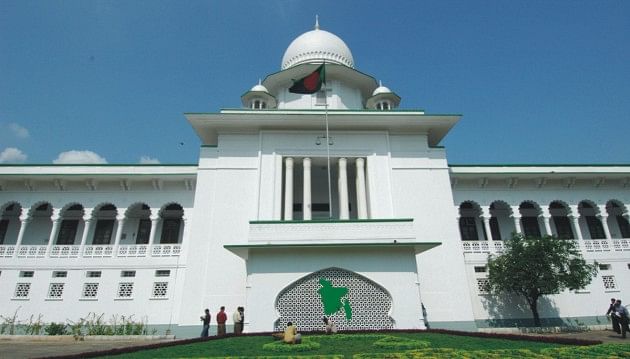
Extra-judicial deaths violate the country's constitution and repeated High Court directives. Photo: Star File
For two days, as his son did not return home from work, Dalil and other family members, went from one police station to the other. In vain, they knocked on different Rab offices. They said they had no idea where Shahjahan could be. A neighbour saw Shahjahan's photograph in a newspaper, where, the neighbour says, it was said: “Top criminal Shahjahan died in a crossfire.” The neighbour rushed to Dalil's shack in Challisher Basty at Johuri Moholla in Muhammadpur.
Dalil, a 70-year-old carpenter narrates how he and his daughter Laboni had run to the morgue on the fateful day of July 10, 2004. “ We had to flee from the morgue leaving my son's dead body behind when a police constable came running to threaten us with arrest if we did not leave the hospital at once,” Dalil says.
Dalil's experience might seem Kafkaesque, but in today's Bangladesh, such incidents are rampant. Extra-judicial murder violates the country's constitution, and prevailing criminal and international laws and repeated High Court (HC) directives.
Article 11 of our constitution says, “The republic shall be a democracy in which fundamental human rights and freedoms and respect for the dignity and worth of the human person shall be guaranteed.”
Even six years after Shahjahan's death, Dalil could not even quite fathom why Shahjahan was killed in such a manner. He still looks for an answer as to how his hard working son, without any criminal record, could possibly be gunned down by law enforcers.
According to the Rab, Shahjahan was caught with a firearm from his workplace. Shahjahan's family and neighbours maintain that it might be a conspiracy of Shahjahan's colleagues, who did not even inform the family after Shahjahan was picked up.
Dalil, however, was lucky to have Chan Miah, a rich brother-in-law, who brought Shahjahan's body home for the funeral on July 11 in 2004.
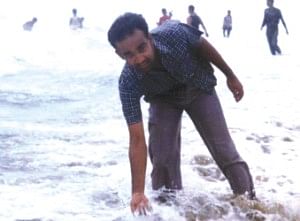 |
Anisur Rahman died in the hands of law enforcement officers. |
The HC ordered law enforcers in a verdict delivered on arrest and remand of people in August 2003: “Relatives of a person arrested from his home or workplace must be informed in an hour's time of bringing him into a police station.”
Shahjahan was not even taken to any police station after his arrest. The sections 60, 61, 62 and 81 of the code of criminal procedure clearly say that the law enforcers cannot detain an arrestee for more than 24 hours without informing the nearest court or a magistrate. Neither Shahjahan nor his family members was given the chance to defend their legal rights though articles 27, 31, 35 and 25 of the constitution ensure peoples' equal right to protection of law, protection in respect of trial and punishment and safeguard to arrest and detention.
All the 1,200 incidents of extra-judicial killing in the custody of the police and the Rab since 2004 are unique in their innovative manner of violating the constitution and laws of the land. The way Rab or police carry out their operations, starting from raiding one's house till his death in their custody is against any law on earth. It begins with the display of an alleged criminal being taken away blindfolded in their car.
“Law doesn't allow any form of torture,” says former Caretaker Government Adviser and retired Inspector General of police ASM Shahjahan.
Just a day after 25-year-old Shahjahan, who was the only son of his father, was buried, a pack of policemen were having a shootout with some criminals in Hossain Shaheb lane at Rayerbazar. A child got caught in the crossfire, and fell on the patio of Mohammad Ali's house.
Mohammad Ali, then a court clerk, along with his wife, Aklima came out in the aid of the child. Soon neighbours crowded his home, which allowed a fleeing criminal to slip into the house unnoticed.
After dispersing the crowd and sending the injured child to the hospital, the police searched Mohammad Ali's house and arrested an alleged criminal named Liton from under a cot.
Already infuriated with the death of one of their colleagues in the shootout, the policemen went mad and ravaged through the entire household, keeping Muhammad Ali and Aklima confined in two separate rooms and beating the couple up with rifle butts.
The cops shoved Ali out to the courtyard. A policeman screamed at him, “You have given them shelter, you are the godfather. Death penalty for you.” According to eyewitness accounts, one of the policemen then opened fire. When his family members finally got him back, Ali's body bore marks of bullet marks in 12 different places of his body.
The Section 163 of code of criminal procedure bans any inducement like threat or making any offer during search, let alone beating. The code clearly states a search to be conducted in the presence of the house owner and two other witnesses to ensure the preparation of a transparent list of seizure. Before that, the officer must have a search warrant obtained from court or the officer-in-charge, maintaining sections 75, 96, 84, 102, 165 and 166 of the code. Article 11 of the United Nations Human Rights Charter ensures everyone's right to be presumed innocent until proven guilty by a court of justice, and article 9 of International Covenant on Civil and Political rights ensures liberty to everyone.
Mohammad Ali's wife Aklima found 22 tolas of gold and Tk 30,000 missing after the police carnage in their house, which clearly violates sections 99 and 166 of the code, ensuring production of the things seized before a concerned officer or court. Aklima was forced to sell their house under intense intimidation after unknown people had made threatening phone calls. Fearing for her life, she now lives with her two children in hiding.
“I have lost faith in the law,” Aklima says.
On the morning of September 10, 2004, Sohel Rahman and his family members woke up in their modest Rayerbazar home to a nightmare – a report published in a widely circulated Bengali daily quoted Rapid Action Battalion (Rab) officials saying that Sohel was wanted as a suspect in an illegal arms trade case.
The family, after they had found out that two more vernacular newspapers had run copycat reports, quickly obtained the first information report (FIR) filed by Rab the previous day on the case. Through the contents of the FIR it became clear that the newspapers had made a terrible mistake. They had confused Sohel with a criminal of his namesake, who lived under another police station.
In the following 19 days every attempt of the family to get a rejoinder published in the newspapers turned futile. As it soon turned out, on the basis of the newspaper reports and ignoring its own FIR, Anisur Rahman, Sohel's younger brother was arrested by Rab on September 31 for questioning in connection with the case.
Sohel's father vividly recalls what the Rab team leader said while raiding his house on October 2. “He brought with him a copy of the newspaper and showed it to me. The Rab-2 personnel told me that as per newspaper reports Sohel is the suspect in illegal arms trade,” Mukhlesur Rahman, a retired food inspector, says.
Mukhlesur Rahman showed a copy of the FIR filed by the Rab itself, trying to point out the mistake.
The Star obtained a copy of the FIR filed by sub-inspector Lokman Hossain of Rab-2 in which the alleged arms dealer Sohel's address is mentioned at 276/1 on Shere Bangla road of Rayerbazar, a place under Hazaribagh police station. The FIR also mentioned Sohel as caretaker of the six-storied building named “Palashbari” where Rab had recovered three revolvers and ammunition from his room on the ground floor on September 9.
Mukhlesur Rahman tried to point out the house he and his children lived was a tin-shed structure and the address is 117/A Sultanganj, Rayerbazar, a place under the Muhammadpur police station. He also mentioned that Sohel Rahman was not a caretaker. He begged the Rab officials to let Anis, Sohel's brother, go free from their custody.
On October 3, family members found severely injured Anis admitted to the Intensive Care Unit of the Dhaka Medical College Hospital where the ill-fated boy succumbed to injuries from severe torture while in Rab custody.
“The report that newspapers carried about my Sohel was nothing but a cock and bull story. A report prepared either in exchange for money or under the influence of political leaders,” Mukhlesur Rahman says.
Sohel Rahman, who is still hiding as he is fearful for his life after the death of his brother Anis, was treasurer of Jatiyatabadi Chhatra Dal (JCD) central committee at that time and a potential candidate in 2002 ward commissioner election of Ward 47 of Dhaka City Corporation (DCC). He was also a registered contractor of the DCC. Anis used to help with his business.
Three national newspapers mistook innocent Sohel Rahman with his namesake arms trader. According to the reports, Sohel not only dealt in illegal arms but a murder case was also pending against him, which served as a final nail on the coffin. Sohel was acquitted from the murder case by a court early this year.
Moazzem Hossain, editor of the Daily Financial Express, has given The Star a telephone interview. He says, “Media will lose its credibility if journalists continue to carry out reports without making their own investigation. It is the ethical responsibility of a journalist. If it is not maintained, the first thing that will happen is that the reporter will lose his/her credibility and the second victim of this trend will be the newspaper or electronic media which is running the story.”
He says that it will have a cumulative chain effect on the media, which might put the entire media industry at stake.
“Like journalists, members of the Rab have the same professional responsibility to maintain the organisation's credibility. They have to investigate before carrying out any activities on their part,” he says.
Family members of victims who died in police or Rab “crossfire” or died from torture in the law enforcers' custody have expressed their anger at the role of different media outlets for their treatment of these incidents. They have also ceased to take every news item published in the papers at its face value.
“The media runs just opposite of facts. Someone is actually making up one fictitious story after the other, sitting in his cosy little chamber and the journalists are getting them published without making any investigation,” Hazi Mohammad Shahabuddin, elder brother of businessman Wasim killed in a so-called crossfire, says.
“We read the newspaper to know the truth. If the newspapers give us false information, we lose faith,” he says.
Shaheed, who prepared the funeral bath of his friend Shahjahan who died from severe Rab torture on July 7, 2004, is angry about media reports.
“Newspapers have covered the killing of Shahjahan as killing of a top criminal of Mohammadpur. Newspapers have acted as betrayers,” Shaheed says, adding that there was no case or GD filed against his friend.
“Besides misleading people by preparing the news without having an incident properly investigated will erode the impact of the media on the society,” Moazzem says.
Akilma, wife of Mohammad Ali killed by police on his home yard, says, “I don't believe the media. Media doesn't cross-examine. They publish whatever someone says, no matter if it has a basis or not.”
Emran Hossain is Staff Reporter of The Daily Star.
Copyright
(R) thedailystar.net 2010 |
